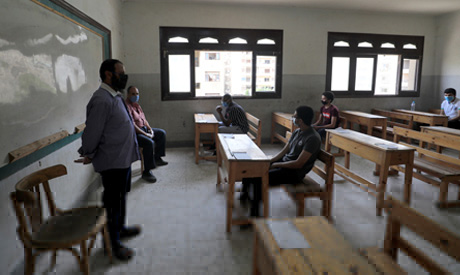
Egyptian high school students wear protective face masks as they attend the first day of final exams, amid concerns over the coronavirus disease (COVID-19) outbreak, in Cairo, Egypt June 21, 2020. REUTERS
Despite growing coronavirus infections, World Health Organisation (WHO) officials have advised against closing educational institutions. In the latest virtual media briefing last week, RanaHajjeh, director of Programme Management at the WHO regional office for the Eastern Mediterranean, said the continuity of education “is critical for children’s learning, development, well-being, health and safety”.
On a similar note, Egypt’s Minister of Health Hala Zayed said on television that even in other countries with a high number of cases, it was unacceptable to close down schools.
Although Zayed was referring specifically to schools, university students feel the same applies to them. Although the academic year began almost two months ago, preventive measures have meant a different learning experience. While late last year, upon the breakout of the coronavirus, education went fully online, this year some universities are adapting a hybrid system.
Universities like AinShams are splitting their curriculum in both physical and online education. Students normally spend a three-hour lecture in two 90-minute periods, between university and home.
At the Modern University for Technology and Information (MTI) courses are either fully online or on campus — with students choosing their preference.
But online education is not easy. WalidHassan said online lectures cannot measure up to physical classes. Hassan lamented the lack of interaction between students and teachers. “Online lectures are no different than passively listening to an online video. It’s convenient in its ability to be played multiple times, but ultimately it’s harder to understand as much as you would’ve in a more active environment.”
Some professors are encouraging more direct interaction with their students, stopping to check if their students are comprehending what’s being said, and using ways to make sure their students are active participants in the lectures.
While attending lectures from the comfort of home may sound tempting, some students are complaining about unsuitable lecture hours. Ziad Ahmed, a private university student, complained that, depending on the schedules, some students go to university multiple times a week, while others can remain at home most of the time.
Nevertheless, not all universities have adopted the hybrid learning system. The American University in Cairo, for example, and the Arab Academy for Science and Technology are continuing with full online curriculum.
This is not the first time that students are exposed to online education. Menna Ahmed, a senior student, says she has been taking online courses to enhance her soft skills such as improving speech and team-building courses. These courses are usually from third party centres which are unrelated to mainstream education.
Moreover, freshmen students are accustomed to digital education. RanaAmr said she did not have any difficulty getting accustomed to the online system at her university because she was already using it in school during high school.
In 2019, the Ministry of Education introduced computer tablets to all high school students as part of its plan to reform and digitise the educational system. Students were studying online and also took their exams online.
While calling for a return to schools, WHO strongly emphasised that information and clear messages on preventing Covid-19 and limiting its spread in schools should be provided to students, teachers, staff and parents. It also stressed that the first and foremost line of defence in the battle against Covid-19 remains preventive public health and social measures. “We urge everyone to make wearing a mask a normal part of being around other people, to maintain physical distancing, and to adhere to hand and respiratory hygiene at all times,” Hajjeh said.
Zayed said that though 75 per cent of Covid-19 patients are above 25 years old, younger people can still contract the disease.
In Egypt, the public throughout the past months havebeen lax about wearing masks, especially with low infections recorded during the summer months. But with higher numbers recorded in recent weeks, Prime Minister Mustafa Madbouli said the government will impose fines on those not wearing masks ridingpublic transport.Zayed said the number of infections was increasing again, especially with the cooler weather. Around 108,000 infections have been confirmed in Egypt.
According to Hajjeh, the pandemic in the Eastern Mediterranean region has reached an alarming juncture. The highest weekly number of cases since the beginning of the virus was reported from 18-24 October. As of 27 October, there were about three million confirmed cases in the region and the number of Covid-19 associated deaths exceeded 75,000, with an overall death rate of 2.5 per cent. Case numbers are expected to grow at an increasing rate during the winter season.
*A version of this article appears in print in the 5 November, 2020 edition of Al-Ahram Weekly.
Short link: